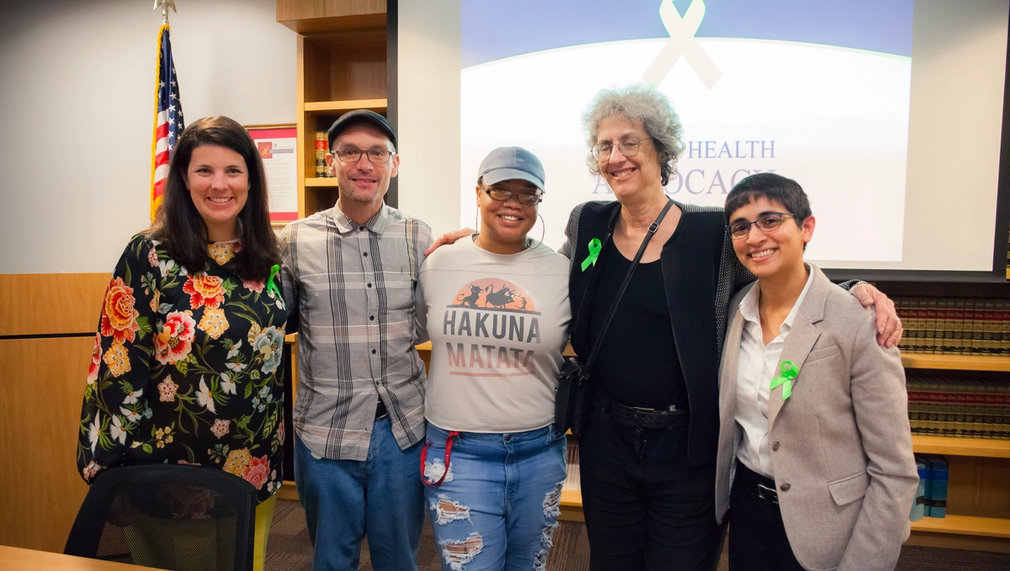Homelessness Prevention: Exercise Your Rights!
MHAS’ Homelessness Prevention: Exercise Your Rights! initiative provides 1:1 legal services and know your rights trainings for low-income Angelenos with mental health disabilities. We help them understand their legal rights, access benefits, clear court records, resolve credit issues, receive mental health care, and fight discrimination. Removing barriers to economic and personal wellbeing improves housing security for individuals with mental health disabilities, including high-risk populations such as older adults and transition-age youth.

What is the primary issue area that your application will impact?
Housing and Homelessness
In which areas of Los Angeles will you be directly working?
County of Los Angeles
In what stage of innovation is this project, program, or initiative?
Expand existing project, program, or initiative
What is your understanding of the issue that you are seeking to address?
Homelessness and housing insecurity are prevalent among those with mental health disabilities. The National Alliance on Mental Illness (NAMI) estimates that 26% of people in homeless shelters have a serious mental illness. The rate is likely higher for those who are unsheltered. In Los Angeles County, that means that more than 17,000 homeless individuals likely have serious mental illness. Specific populations with mental health disabilities are even more prone to homelessness. Transition-age youth (TAY), for example, have higher rates of mental health disabilities and high rates of homelessness. Youth.gov reports that 50% of children involved in the child welfare system and 67% of those involved in the juvenile justice system have mental health disorders. Youth.gov also reports that youth who have lived in foster care have higher rates of mental illness. In 2020, the Greater Los Angeles Homeless Count reported a 19% increase in transition-age youth (TAY) homelessness.
Describe the project, program, or initiative this grant will support to address the issue.
MHAS’ Homelessness Prevention: Exercise Your Rights! initiative provides legal resources and guidance for records expungement, obtaining benefits, resolving landlord disputes, repairing credit, and ensuring mental health care—all integral components of preventing homelessness among Angelenos with mental health disabilities. During the grant period, MHAS will provide free legal services to 500 low-income individuals with mental health disabilities who are experiencing housing instability. Services will range from brief advice and counsel meetings to more in-depth and extensive legal representation that may last beyond the grant period depending on the needs of each client, legal issues involved, and applicable law. During the course of the grant period, MHAS will also develop partnerships with other community-based organizations to help us identify and serve more people with mental health disabilities who are housing insecure or homeless. Finally, during the grant period, MHAS will conduct at least four awareness and know your rights training sessions to help the Los Angeles social services community better address homelessness for those with mental health disabilities. MHAS’ approach to homelessness prevention is unique in addressing multiple barriers that prevent those with mental health disabilities from obtaining and maintaining stable housing. In addressing underlying causes of housing instability and poverty, we help clients achieve long-term success.
Describe how Los Angeles County will be different if your work is successful.
MHAS is successful when more Angelenos with mental health disabilities – those who are most at risk of housing insecurity or homelessness – are able to overcome challenges or crises that would otherwise leave them homeless. Addressing barriers that impede employment, government benefits, and access to mental health care as well as preventing housing discrimination yield short-term successes for clients. Educating Angelenos with mental health disabilities on their rights as tenants, consumers, employees, and patients is a long-term solution that empowers those with mental health disabilities to become more independent, achieve greater economic security, and improve access to mental health care. Short- and long-term successes will promote self-sufficiency and community engagement for at least 500 Angelenos during the grant period to help them thrive in the community. As those who are most vulnerable thrive, all of Los Angeles County flourishes.
What evidence do you have that this project, program, or initiative is or will be successful, and how will you define and measure success?
MHAS tracks client and case outcomes and analyzes aggregate data to assess impact. We track the number of clients who request direct (e.g., tenant-landlord disputes) or indirect (e.g., employment or benefits access) assistance that impacts housing security. Over the past year, MHAS assisted 500+ clients with direct housing concerns and 2,000+ clients with indirect housing concerns. MHAS also tracks the outcome of each case, and more than 80% of extended services cases closed last year (direct and indirect housing issues) resulted in favorable actions or resolutions for clients and helped prevent homelessness. MHAS also tracks services for special populations, including an expanded focus on serving TAY with mental health disabilities. We piloted TAY-focused services over the past nine months and have so far helped 30 TAY resolve legal issues and avoid homelessness. Expanding MHAS’ housing-focused work will improve housing stability for more Angelenos with mental health disabilities.
Approximately how many people will be impacted by this project, program, or initiative?
Direct Impact: 500
Indirect Impact: 2,500
Describe the specific role of the partner organization(s) in the project, program, or initiative.
Not Applicable